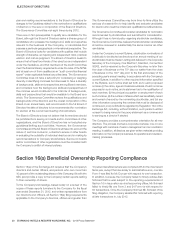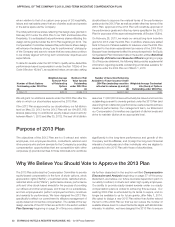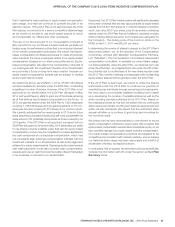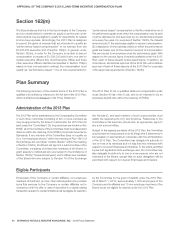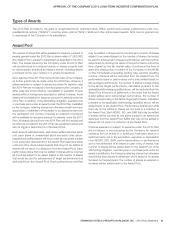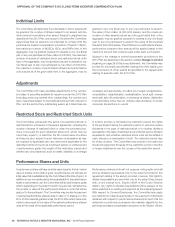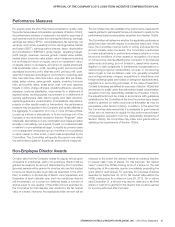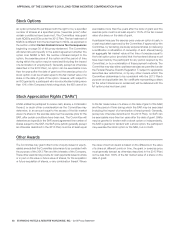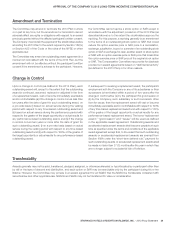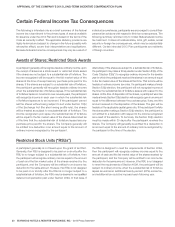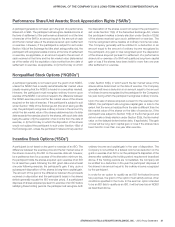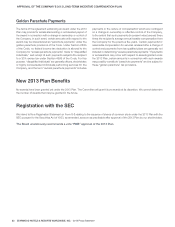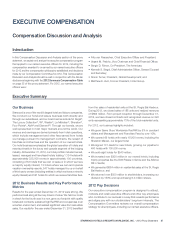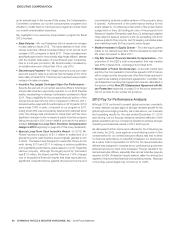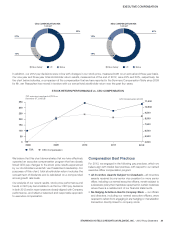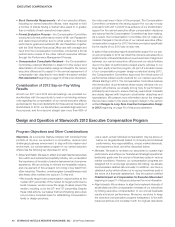Starwood 2012 Annual Report Download - page 36
Download and view the complete annual report
Please find page 36 of the 2012 Starwood annual report below. You can navigate through the pages in the report by either clicking on the pages listed below, or by using the keyword search tool below to find specific information within the annual report.
STARWOOD HOTELS & RESORTS WORLDWIDE, INC.-2013Proxy Statement30
APPROVAL OF THE COMPANY’S 2013 LONG-TERM INCENTIVE COMPENSATION PLAN
Certain Federal Income Tax Consequences
The following is intended only as a brief summary of the federal
income tax rules relevant to the primary types of awards available
for issuance under the 2013 Plan and is based on the terms of the
Code as currently in effect. The applicable statutory provisions are
highly technical and subject to change in the future (possibly with
retroactive effect), as are their interpretations and applications.
Because federal income tax consequences may vary as a result of
individual circumstances, participants are encouraged to consult their
personal tax advisors with respect to their tax consequences. The
following summary is limited only to United States federal income
tax treatment. It does not address state, local, gift, estate, social
security or foreign tax consequences, which may be substantially
different. Certain intended 2013 Plan participants are residents
of foreign countries.
Awards of Shares; Restricted Stock Awards
A participant generally will recognize taxable ordinary income upon
the receipt of shares as a stock award or restricted stock award
if the shares are not subject to a substantial risk of forfeiture. The
income recognized will be equal to the fair market value of the
shares at the time of receipt less any purchase price paid for the
shares. If the shares are subject to a substantial risk of forfeiture,
the participant generally will recognize taxable ordinary income
when the substantial risk of forfeiture lapses. If the substantial risk
of forfeiture lapses in increments over several years, the participant
will recognize income in each year in which the substantial risk
of forfeiture lapses as to an increment. If the participant cannot
sell the shares without being subject to suit under Section16(b)
of the Exchange Act (the short swing profi ts rule), the shares
will be treated as subject to a substantial risk of forfeiture. The
income recognized upon lapse of a substantial risk of forfeiture
will be equal to the fair market value of the shares determined as
of the time that the substantial risk of forfeiture lapses less any
purchase price paid for the shares. The Company generally will
be entitled to a deduction in an amount equal to the amount of
ordinary income recognized by the participant.
Alternatively, if the shares are subject to a substantial risk of forfeiture,
the participant may make a timely election under Section83(b) of the
Code (“Section83(b)”) to recognize ordinary income for the taxable
year in which the participant received the shares in an amount equal
to the fair market value of the shares at that time. That income will be
taxable at ordinary income tax rates. If a participant makes a timely
Section83(b) election, the participant will not recognize income at
the time the substantial risk of forfeiture lapses with respect to the
shares. At the time of disposition of the shares, a participant who has
made a timely Section83(b) election will recognize gain in an amount
equal to the difference between the purchase price, if any, and the
amount received on the disposition of the shares. The gain will be
taxable at the applicable capital gains rate. If the participant forfeits
the shares after making a Section83(b) election, the participant is
not entitled to a deduction with respect to the income recognized
as a result of the election. To be timely, the Section83(b) election
must be made within 30 days after the participant receives the
shares. The Company will generally be entitled to a deduction in
an amount equal to the amount of ordinary income recognized by
the participant at the time of the election.
Restricted Stock Units (“RSUs”)
A participant generally is not taxed upon the grant of an RSU.
Generally, if an RSU is designed to be paid on or shortly after the
RSU is no longer subject to a substantial risk of forfeiture, then
the participant will recognize ordinary income equal to the amount
of cash and the fair market value of the shares received by the
participant, and the Company will be entitled to an income tax
deduction for the same amount. However, if an RSU is not designed
to be paid on or shortly after the RSU is no longer subject to a
substantial risk of forfeiture, the RSU may be deemed a nonqualifi ed
deferred compensation plan under Section 409A. In that case, if
the RSU is designed to meet the requirements of Section 409A,
then the participant will recognize ordinary income equal to the
amount of cash and the fair market value of the shares received by
the participant, and the Company will be entitled to an income tax
deduction for the same amount. However, if the RSU is not designed
to meet the requirements of Section 409A, the participant will be
subject to ordinary income when the substantial risk of forfeiture
lapses as well as an additional twenty-percent (20%) excise tax,
and additional tax could be imposed each following year.


